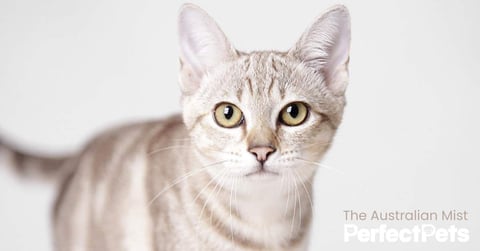The Australian Mist - A solution to help protect wildlife?
Despite the popularity of domestic Cats as pets, they have a dark side. The Invasive Species Council estimates cats kill more than two billion Australian native animals each and every year, and that cats have had a major role, along with foxes, in the extinction of 25 native species. These statistics are truly concerning and, if they continue, the future viability of many Australian species must truly be called into question. Much of this predation is due to the activities of feral cats – domestic cats gone wild – but pet cats also play a significant role in the decline of native animals in urban and rural Australia.

Photo Credit: Patricia Beech Artumblom Cattery
Solutions to a growing problem
There have been many ideas and attempts to curb the incidence of domestic cat predation in Australia. In some local government areas, cat curfews are in place. In these locations, cats are not allowed to free roam at various times, or to leave the confines of an owner’s property. Owners can be fined if their cats are caught by council rangers. Various organisations, including the RSPCA, advocate for all pet cats to be kept indoors, or secured in outdoor enclosures, to protect both cats and native wildlife. Many experts believe cats should be prevented from roaming, not only to protect native species, but also to protect the cats themselves. The RSPCA Cat Protection Project has found that the average lifespan of a cat with outdoor access is estimated to be some 10 years shorter than that of a continuously confined cat.
The controversy around cat control
The subject of cat control has been very controversial. Proponents on both sides of the argument hold very strong views. Many owners argue that their cats are unsuited to life indoors, indeed, keeping them confined in such a way is viewed by some as cruel. Purchasing an outdoor enclosure large enough to hold a cat can be expensive, and not all individuals or breeds are suited to such confinement. Meanwhile, millions of native animals are being lost every single day.
Breeder efforts and new indoor-centric breeds
One question emerges: why haven't breeders made efforts to develop cats with a lower prey drive? Or that are better suited to a life indoors, or in an enclosure? In fact, this work has been happening; and it's being carried out right here in Australia.
Introducing the Australian Mist : A homegrown solution for eco-conscious cat lovers
Formerly known as the Spotted Mist, the Australian Mist was developed by Australian cat breeder Dr. Truda Straede. Truda combined her ecological concerns with her interest in cat breeding, and worked towards an ‘environmentally friendly’ pet cat that is more people-centred and naturally relaxed in a human environment. The all Australian breed, the Australian Mist, is Australia’s only homegrown breed.
Developed under the very strict regulations of the NSW Cat Fanciers Association Inc, the Australian Mist has a large gene pool, which was derived from over 35 foundation cats. Breeds used to develop the Australian Mist include the Abyssinian and Burmese. The Burmese breed was essential to the development of the Australian Mist’s more "laid back" nature, the Abyssinian to its intelligence and the remaining input from well spotted friendly domestics contributed to its vigour. The result of Truda’s efforts has been a breed that will actively seek out human company. They are relaxed indoors as well as being suited to outdoor cat enclosures. In addition to revelling in human companionship, Australian Mists are also more likely to happily coexist with your other family pets.
The intelligent, loving nature of the Australian Mist
Lisa, is an owner of multiple Australian Mists and gives the following assessment of the breed: "If you are after a loving, pretty, intelligent, talkative cat, then the Australian Mist is for you. They will bond with you like a dog and if you chat with them, they will respond. You will absolutely fall in love with them. Besides that, they will never ever draw a claw or hiss at you provided you treat them right. They want to lie on you any chance they get whether you like it or not! They want to be with you and miss you when you are away! They are also sensitive so there is not much need to growl at them if they do something wrong. One clap of the hands and a low voice and that will do it. They also love their food so monitor their weight as they age as they can get diabetes if they get too big. A brush once a week to keep them looking gorgeous and you have the perfect cat who will love you as much as you love them."
Good health and a desire for human company
Australian Mists are moderate size cats with large green eyes and expressive ears. They have a short coat which comes in a range of colours such as warm brown, blue, chocolate, lilac, gold and peach, with patterns of delicate spots or intricate marbled swirls against a misty background. Importantly, the availability of genetic testing has meant the breed is generally very healthy. Australian Mists are free from all testable genetic health concerns.
Truda's work has shown that, while it's difficult to alter a cat's inherent hunting nature, that behaviour can be directed more towards human interaction, leading to a cat that seeks out human company and becomes a member of the family. "They want to hang out with people", Truda says. "They will follow you outside, but will march back inside as soon as you do."
Your next cat: Great reasons to choose the Australian Mist
The work of Truda Straede has been ground-breaking, but mostly unknown in the wider community. That's a real shame because, with publicity and support, a problem noted by so many cat owners (their pets unwillingness to stay indoors) could be alleviated. With the immense problems associated with cats and native animals, the ongoing work to develop the Australian Mist should be celebrated and supported. And after all, here is a breed of cat that is not just "Aussie made", but is also "Aussie wildlife friendly".
Connecting with verified and reputable Australian Mist breeders
If you're looking for an affectionate, healthy and house-cosy cat, the Australian Mist is certainly worthy of your consideration. You can get in touch with our fully verified and reputable Australian Mist breeders here.
Love cats and wildlife? These articles might also interest you...
If saving native animals isn't enough to convince you that containing your cat is a good idea, research shows that indoor cats, or cats that are contained outdoors, live longer lives than cats who roam free. Our friends at Catnets have a range of cat netting solutions and portable cat enclosures available to keep all cats and wildlife safe.
How to be an eco-friendly cat owner and keep wildlife safe
We care about our planet and adore our cats, so with mounting evidence showing that pet food production and pet products are contributing to unhealthy ecosystems and climate change, it's important that we look at ways to minimise our impact. In this article, we look at how to be an eco-friendly cat owner while also minimising threats to biodiversity.
There are so many good reasons to keep pet cats indoors. Like protecting their owners from the weird mind-controlling parasitic brain infection that rodent-eating cats can pass on. Or protecting them from dog attack, being hit by a car, or fighting with the neighbourhood tom and picking up Feline AIDS. But possibly the most important reason is to prevent your sweet kitten from feasting on the local wildlife.
Wildlife in suburban Australia, including your own backyard
People from many big cities elsewhere may seldom get a chance to experience wildlife directly, but Australians are lucky. Visitors from overseas are often amazed at the colourful birds such as rainbow lorikeets so common in many suburbs and taken for granted by many Aussies.
In a country where so many mammals have become extinct in the past couple of centuries most suburbs also harbour at least one and often two species of possum, some even boasting koalas or wallabies. Read about ways to support wildlife


